Longevity’s Gisèle Wertheim Aymes spoke to a New York-based author, health coach, and holistic healer, Kadeem One. He is a man with a wellness mission. Serving in one of the underserved parts of our community when it comes to post-traumatic stress disorder (PTSD) and racial-based trauma.
Kadeem believes black men need better support tools to achieve healthier life outcomes. He’s also a firm believer that there’s a way to enable people from all economic backgrounds to access basic mental health and self-care practices more affordable.
The Stats
The statistics are pretty bleak when it comes to the state of health of black men in the US. Black males rank highest in regard to the disparities seen among individuals and groups that lack access to proper healthcare.
In fact, the life expectancy of black males ranked the lowest compared to other ethnic groups. By as much as 6 to 9 years – showing that they are far more likely to die prematurely.
Reports also indicate a key factor in this type of disparity in access to basic mental health services. In fact, a systematic review regarding PTSD acknowledged the lack of access to professional mental health services for black male trauma survivors.
Recognizing this dire state of affairs, Kadeem One has developed accessible meditative techniques. Using his own personal experience, he’s successfully teaching men (and others) coping skills to achieve positive wellness outcomes.
A healing journey of his own
So how did Kadeem find himself in a world of holistic healing?
This health coach is no stranger to life’s challenges. In fact, he discovered his life’s calling after experiencing his own health crisis.
“I started off my career in dance. But very early on as a college freshman, I had an injury that stopped me from dancing. I couldn’t dance for the entire semester.
I went to different doctors. They were trying to figure out what was wrong. I was literally told to take Tylenol Advil four times a day. But the pain did not go away and my body was taking massive strain because I was taking so many pills.”
Kadeem explained how his mother became his healer. She also changed his career trajectory. His mother had been going through a really rough breakup with his father and happened to connect to a healer at their church. She told Kadeem that after her first session with him, she felt like the weight of the world was lifted off her shoulders.
“She felt such a sigh of relief. The energy healer empowered my mother to heal herself naturally. My mom passed this knowledge along to me. She taught me how to manage my pain without painkillers.
I became her guinea pig. And that’s how I learned about the power of using holistic healing methods.”
A journey to lifelong healing
From then on, Kadeem started learning about other healing modalities. He expanded his repertoire to include hypnotherapy, aromatherapy, and meditation.
“I began working with a lot of black men. I learned a lot from them. They told me they were really having a really tough time. I said, okay, there’s something here. Black men don’t really have an outlet to really release what they’re going through.”

Trauma is a taboo subject
He says the concept of post-traumatic stress disorder, or mental illness among black men, is a taboo subject.
“I mean, there’s a lot of people who just don’t want to admit that they’re really having a hard time. I think most people don’t really want to let it all hang out.
And if we do share our anxieties, it can attract the wrong response. People often don’t get positive affirmation when they are struggling with mental health challenges.”

Photo by nappy from Pexels
Kadeem agrees the Covid-19 pandemic may have changed this to some extent.
“People are becoming more sensitive to the rising mental health challenges in society. However, when it comes to who suffers the most, black males are really not in a good space. In fact, they’re, they’re right at the bottom of the rankings. in terms of population and demographic groups.”
He believes race-based stress and PTSD are inter-related. Research shows people who experience race-based stress and trauma frequently have similar experiences to people who have PTSD.
Distress can include flashbacks, hyper-vigilance, nightmares, heart palpitations, poor sleep and overall heightened anxiety.
The impact of discrimination
According to Williams & Mohammed, perceived discrimination has been defined as the perception or belief that one has been treated in a negative, aggressive, or unfair way by institutions and individuals. This is primarily a function of personal characteristics. These include race, ethnicity, skin color, gender, and other demographic factors.
There has not been enough research exploring the relationship between perceived discrimination experiences specific to minority groups and the development of PTSD.
Kadeem says racial trauma is enduring and needs to be addressed
But where PTSD can be caused by a single event, racial stress is ongoing, pervasive, generationally transmitted. It affects both individuals and collective communities. Thus, beyond PTSD symptoms, racial trauma has enduring and re-triggered cognitive, emotional, and somatic consequences.
Research has shown that perceived discrimination is linked to poorer health outcomes (American Psychological Association, 2016).
Race-based trauma has negative impacts on functioning and quality of life. Importantly, it impacts other forms of mental illness, suggesting its potential role as a risk factor for PTSD as well.
Microaggressions
The culmination of hundreds of well-meaning, seemingly innocuous comments about black peoples’ appearance, language, and emotions causes racial trauma. Exposure to repeated stressors can lead to long-term increases in stress hormones in the body.
These exacerbate mental health issues such as anxiety and depression. These, in turn, are associated with a host of negative health outcomes, such as high blood pressure and increased risk of cardiovascular events.
Events that can cause racial trauma include threats of harm and injury, humiliating and shaming events. Also just by witnessing racial discrimination and microaggressions toward yourself or others.
“I’ve experienced micro-aggressions regularly. It is not unusual to get in an elevator and have a woman look at me and then clutch her purse.
Or the time when I was traveling with my family in South Carolina, and a truck passed by. The guy in the passenger seat, wound down the window. He put his hand up and made the motion of discharging a gun aimed at us.”
Microaggressions take many forms and happen daily. Simply based on race and the fact that I am a black male. This is how society sees me and how the media has reflected us over time. Race-based micro-aggressions can have a powerful impact on health outcomes.
Kadeem One on healing
This may all seem altruistic. However, Kadeem believes that healing racial trauma and PTSD requires a multifaceted and holistic approach, with creative interventions that go beyond conventional therapeutic frameworks. Of course, these conventional modalities have their place.
However, with his programs, he draws on culturally relevant holistic ways of healing, such as storytelling, affirmation, meditation, and music.
“There must be more accessible help for individuals who are affected by racial trauma. Oftentimes, people who experience racism are invalidated or told that they need to “get over it” or “stop being so sensitive.” Sometimes feeling invalidated means people stop talking about their pain and just live with it.“
Psychological research tells us that talking about our pain can help soothe us, and help us feel like we aren’t alone.
So how does he do it?
Kadeem believes people should take control of their wellness. He’s merely a facilitator, an enabler.
His mission is threefold: To help alleviate the suffering of others. Offer knowledge and share tools to help people spiritually grow. And to provide a safe and friendly space to nurture the holistic well-being of individuals.
That’s why he has developed specific courses which empower his clients to take control over their wellness.
Ranging from one to four hours, he says his workshops aim to leave you in a much better place than you were when you started.
“Core points might include live meditation, energy clearing, reprogramming neurology, recognizing potential, and/or manifesting desire. I work in person and online. I offer energy clearing sessions, forgiveness workshops, and prosperity classes with actionable techniques for manifesting what you truly want.”
Kadeem concludes that trauma among black men is an emergency situation, right now.
“Of course there has been some improvement and more awareness about the injustices faced by black people in America.
February is Black History Month and ongoing initiatives like Black Lives Matter are helping to create a forum for discussion and better understanding. However, this is not enough.
We need to find a way to really help people with practical, active tools to heal their core: physically, emotionally and spiritually. And then I think we’ll all be in a much better place.”
About Kadeem One
Kadeem One is an energy healing practitioner, hypnotherapist, meditation teacher, aromatherapist, and inspirational speaker. He has worked with varying populations at Google, Yahoo, Verizon, Bloomberg, Audible, Mt. Sinai Hospital, New York University, St. Francis College, Brooklyn Friends School, Gibney Dance, Bailey’s Café, The Actors Fund Arts Center, The World Policy Institute and others.
His expertise has been featured in Martha Stewart Living, The Huffington Post, Medium, and Heathline. Kadeem is the co-founder and co-director of Full Force Wellness Repertory. This is the only organization in North America that integrates the physical, mental, and emotional well-being of individuals all at the same time through clinical and alternative wellness practices. His courses that are currently available include Wax On, Wax Off: Cleaning Your Energetic Field for Dynamic Renewal, SUPERcharge Your Prosperity, Forgive U. Forgive Me, Attract Abundance… Yes, Even Now!
References
https://www.ncbi.nlm.nih.gov/pmc/articles/PMC6338337/#R6
https://www.ncbi.nlm.nih.gov/pmc/articles/PMC6338337/#R71
https://www.verywellmind.com/ethnic-and-racial-differences-in-ptsd-2797434






![women [longevity live]](https://longevitylive.com/wp-content/uploads/2020/01/photo-of-women-walking-down-the-street-1116984-100x100.jpg)









